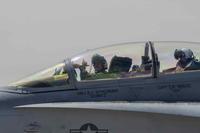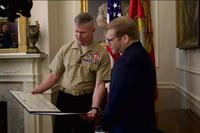
Despite flat oil exports and a struggling economy, Iraq has embarked on a comprehensive program to re-arm its embattled security forces. That's focus of my latest feature for World Politics Watch:
The country is buying American patrol planes, Italian naval vessels, Russian helicopters and armored vehicles co-produced by American and British firms. The new equipment is utilitarian stuff -- optimized for patrols in and over Iraq's teeming cities and on its smuggler-infested waters rather than for attacks on external foes -- and reflects the complete inward focus of Iraq's military. But the purchases do little to solve the forces' nearly complete lack of logistics capability.
Iraq has spent around a billion dollars on new weapons in the past year, but all the new planes, vehicles and patrol boats do nothing to address Iraqi forces' fundamental flaws, including their nearly total lack of logistics ability, as I explained in a story for National Defense Magazine a few months back:
After three years of training by coalition advisors, Iraqi forces in southern Iraq are capable of planning and commanding operations. But their logistics systems remain deeply flawed, and the Iraqis rely on British and U.S. forces for supplies and spares support for all but the most basic functions.
Plus, it doesn't matter how well armed Iraqi forces are if they can't deploy within their own country, a problem I addressed last year for The Washington Times:
The 700-strong Kurdish Iraqi army battalion, originally from the northern city of Sulaimaniyah, deployed to Balad recently to bolster a single Shi'ite battalion mustered from local residents. ... The large Sunni minority living around Balad has protested the Kurdish unit's presence, said U.S. Army Lt. Col. David Coffey, a member of an ad hoc military transition team that is helping train the Kurdish battalion. He said the residents have resisted the presence of the Kurdish battalion with such force that commanders are afraid to let the soldiers leave their base, which is adjacent to a U.S. compound outside the city.
But then, Arab militaries have a bad habit of buying impressive-looking weapons that they're incapable of using to advantage. Saudi Arabia's latest spending spree, for example, includes new Apache attack choppers, Typhoon fighters and the latest Abrams tanks. But that country remains incapable of defending itself, according to the Federation of American Scientists.
-- David Axe, cross-posted at War is Boring (with video!) and Ares








